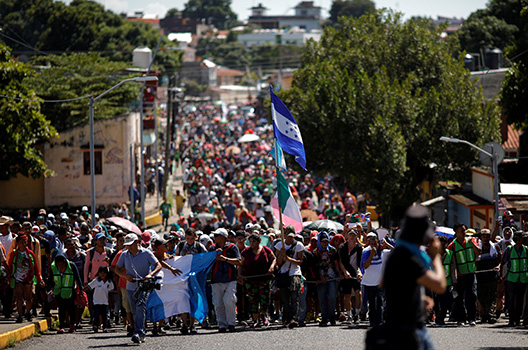Now is not the time for the United States to shun Central America. Instead, the United States should double down on engagement with Central America’s Northern Triangle countries (Guatemala, El Salvador, and Honduras) to address the violence, poverty, and endemic corruption that are pushing people to leave. Engagement is, after all, in the best interest of US national security.
On October 12, a group of less than 200 people organized in San Pedro Sula, in northern Honduras, to begin a treacherous journey toward the United States. By October 24, the caravan had grown to nearly 7,000 people—the largest the region has ever seen—and had reached forty-five miles into southern Mexico.
Escaping inhospitable conditions in their home countries, men, women, and children hope to find a safer, better future in the United States. But in the United States, President Donald J. Trump has other plans.
Less than two weeks before the November 6 midterm elections, Trump has honed in on the Central American caravan. On Twitter, he has threatened to cut aid to the region, close the US border, and deploy the military. Adding to the noise around the issue, he made unsubstantiated claims that the caravan consisted of Middle Easterners and MS-13 gang members.
In May 2017, the Atlantic Council’s Adrienne Arsht Latin America Center sought to move the needle toward increased US engagement with the Northern Triangle in an effort to build a better future for Guatemalans, Salvadorans, and Hondurans. The Northern Triangle Security and Economic Opportunity Task Force mobilized US policymakers and in-country leaders to push toward cooperation around the top issues for long-term regional prosperity: sustainable economic development, rule of law, and security.
Today, the Northern Triangle Task Force is a reminder that the future of the United States is tied to the stability and prosperity of Guatemala, El Salvador, and Honduras. Its findings should continue to serve as a blueprint for a multiyear, bipartisan, on-the-ground approach that would strengthen US national security by way of stabilizing and strengthening these three countries.
Here are the key recommendations from the report, for both the United States and the Northern Triangle:
I. Building Sustainable Economic Development
United States:
-
- Support the infrastructure fund coordinated by the Inter-American Development Bank (IDB) and promote an oversight committee composed of multilateral institutions, civil society, and the private sector.
- Focus assistance on migrant-sending communities and intermediary cities.
- Increase information-sharing to help put in place an effective system to help reintegrate returned Northern Triangle residents.
Northern Triangle:
-
- Prioritize improving secondary and tertiary roads in key economic development zones and focus funding on strategic sectors for economic growth.
- Promote more effective job reinsertion programs for former gang members.
- Reduce informality with a sector-specific strategy that includes stricter penalties for business tax evasion.
II. Strengthening the Rule of Law
United States:
-
- Continue supporting the work of the International Commission Against Impunity in Guatemala (CICIG) and ensuring the success of the Organization of American States’ Mission to Support the Fight Against Corruption and Impunity in Honduras (MACCIH) and El Salvador’s anti-impunity unit.
- Continue to tie key foreign assistance to jointly-agreed benchmarks for progress and impact.
- Offer increased technical assistance to banking and regulatory agencies, the private sector, and multilaterals.
- Direct existing funds toward understaffed fiscalías (attorney generals).
Northern Triangle:
-
- Increase transparency in the election of secondary public officials.
- Create incentives to digitize financial transactions and reduce reliance on cash.
- Implement an accelerated roadmap to comply with international anti-money laundering standards.
III. Improving Security
United States:
-
- Strengthen and promote properly implemented community policing initiatives.
- Ramp up financial and technical support to reform the prison system.
- Work with Northern Triangle authorities to identify, monitor, and constrict illicit corridors.
Northern Triangle:
-
- Improve police accountability through: greater independent reporting and denouncing of police abuses; and new internal and external controls in the police force.
- Implement comprehensive criminal prison reform, focused on rehabilitation.
- Target high-risk neighborhoods for increased social and educational programs.
Follow the Adrienne Arsht Latin America Center on Twitter @ACLatAm.
Image: Central American migrants, who are part of a caravan of migrants trying to reach the United States, walk on a street as they continue their journey in Tapachula, Mexico October 22, 2018 (REUTERS/Ueslei Marcelino/File Photo)
